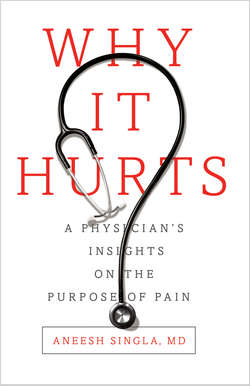Читать книгу Why It Hurts - Dr. Aneesh Singla - Страница 9
На сайте Литреса книга снята с продажи.
Pain and the Withdrawal Reflex
ОглавлениеBut pointless suffering is only part of the picture. Pain is essential in helping us process and interpret our environment. It is no understatement to say that pain is vital to life and to our survival as a species.
We have many reflexes that help us adapt and survive, and pain plays a part in many of them. The withdrawal reflex, triggered by pain, drives us to unconsciously pull back from potentially damaging situations. When our eyes dry out or come in contact with dust or a foreign object, the trigeminal nerve detects this discomfort and signals our brain, which in turn tells the facial nerve to tell our eyelid to blink. This blink reflex helps lubricate the eye to keep the cornea from drying out.
You can override the blink reflex, but it’s uncomfortable. Think of your last staring contest, or of the effort of keeping your eyes open during the flash of a family photo. Both of these are examples of how you can modulate the blink reflex by focusing on and inhibiting it. Overriding the blink reflex for too long is not only uncomfortable, but it can also result in damage to your eye. To an extent, the same is true for the adaptive side of pain. We can modulate its actions and severity, but in the end we need it to survive.
Other common reflexes include the cough reflex, which might be triggered when food goes down your windpipe, and the itch reflex, which alerts you to scratch when mosquitoes are making unsanctioned withdrawals from your blood supply. These involuntary actions are common, protective responses that are usually adaptive. While they each have the potential to become maladaptive in certain situations—a chronic cough after a cold, the ceaseless itch of an allergic reaction—we have to keep their protective qualities in mind as we cope with them. Pain is no different.
One example of the many subtle ways pain protects you below the level of conscious thought happens when we run. If you pay attention during a run, you’ll notice yourself automatically making adjustments to your gait as you go. This is the pain reflex warning you whenever an area of your body experiences too much repetitive stress so you can adjust your stride before lasting damage—a torn ligament, a sprained ankle—occurs.
It’s not quite as immediate a reaction as the blink reflex, but it still involves input that travels from an extremity through your spinal cord to your brain, where it is processed. In response, your brain sends instructions to compensate. While it’s likely that you process this information subconsciously, the fact remains that pain made you change your behavior. If you couldn’t feel that pain, you’d risk getting a blister, a stress fracture, or worse. Pain provides your brain with constant feedback for adjustment, both consciously and subconsciously, every minute of the day.
In A New Earth: Awakening to Your Life’s Purpose, Eckhart Tolle writes, “The body operates by an intelligence that we don’t fully understand.” I believe we can learn to recognize and appreciate the intelligence and wisdom of the human body when it comes to pain. We have evolved with the spirit of survival as our most paramount goal; pain facilitates that survival. If we do not see pain’s value, I would argue that we threaten our own survival.
